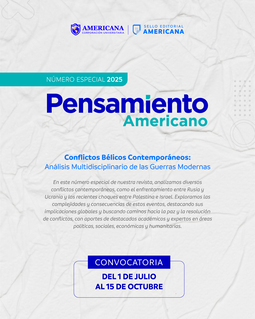Aprendizaje basado en proyectos en la asignatura de Estrategia de Operaciones
DOI:
https://doi.org/10.21803/penamer.16.31.571Palabras clave:
Aprendizaje basado en proyecto, Simulación empresarial, Desarrollo de competencias, AutoaprendizajeResumen
Introducción: El aprendizaje basado en proyectos en una estrategia de enseñanza que promueve el aprendizaje experiencial y situado en los estudiantes. Objetivo: La presente investigación tiene como objetivo conocer cuál es la percepción de los estudiantes frente a la implementación del Aprendizaje Basado en Proyectos (ABP) en la asignatura de Estrategias de Operaciones de la Universidad del Norte en el periodo 2020-03. Metodología: para tal fin se implementó un método de investigación cuantitativa a 65 estudiantes utilizando como herramienta un formulario con preguntas tanto abiertas como cerradas tipo Likert donde se busca indagar sobre su grado de satisfacción y posición frente a diversos aspectos referentes a la asignatura. Resultados: Los resultados demuestran un grado alto de satisfacción de los estudiantes frente a la metodología de clase en línea como también frente al ejercicio de simulación de empresa enmarcado en el ABP de manera en que encuentran el ejercicio útil para el aprendizaje de la asignatura y las temáticas relacionadas. Conclusión: Se puede concluir que los cambios y mejoras tuvieron un efecto positivo en las variables estudiadas, específicamente en satisfacción con la experiencia de aprendizaje y la motivación.
Descargas
Referencias
Bramwell-Lalor, S., Kelly, K., Ferguson, T., Gentles, C. H., y Roofe, C. (2020). Project-based learning for environmental sustainability action. Southern African Journal of environmental education, 36, 57-71.
Elementos clave para un modelo de aprendizaje basado en proyectos colaborativos online (ABPCL) en la Educación Superior. (2020). American Journal of Distance Education, 34(3), 241–253. https://doi.org/10.1080/08923647.2020.1805225
Farrell, F. & Carr, M. (2019). The effect of using a project-based learning (PBL) approach to improve engineering students’ understanding of statistics. Teaching Mathematics and its Applications: An International Journal of the IMA. 38(3), 135–145. https://doi.org/10.1093/teamat/hrz005
Kokotsaki, D., Menzies, V. & Wiggins, A. (2016). Project-based learning: A review of the literature. Improving schools, 19(3), 267-277.
Krajcik, J. & Blumenfeld, P. (2005). Project-Based Learning. In R. Sawyer (Ed.), The Cambridge Handbook of the Learning Sciences. pp. 317-334. Cambridge Handbooks in Psychology, Cambridge University Press. doi:10.1017/CBO9780511816833.020
Mateo, E. & Sevillano, E. (2018) Project-based learning methodology in the area of microbiology applied to undergraduate medical research. FEMS Microbiology Letters, 365(13). https://doi.org/10.1093/femsle/fny129
Mutakinati, L., Anwari, I. & Kumano, y. (2018). Analysis of Student´s Critical Thinkking Skill of Middle Scholl through STEM Education Project- Based Learning. Journal Pendidikan IPA Indonesia. 7(1), 54-65. DOI:10.15294/jpii.v7i1.10495
Ngereja, B., Hussein, B. & Andersen, B. (2020). Does Project-Based Learning (PBL) promote student learning? A performance evaluation. Education Sciences, 10(11), 330. https://doi.org/10.3390/educsci10110330
Porto, A. & Álvarez, L. A. (2017). Estructuras organizacionales: nuevas tendencias. Ad-Gnosis, 6(6), 77-83.
Rodríguez-Sandoval, E., Vargas-Solano, É. M. y Luna-Cortés, J. (2010). Evaluación de la estrategia “aprendizaje basado en proyectos”. Educación y educadores 13(1), 13-25.
Thomas, J. (2000). A Review of Research on Project-Based Learning. http://www.bobpearlman.org/BestPractices/PBL_Research.pdf
Villarreal, J. E., Muñoz, G., Pérez, H., Corredor, A., Martines, E. A. & Porto, A. (2017). El desarrollo de habilidades investigativas a partir de resolución de problemas. Las matemáticas y el estado nutricional de los estudiantes. Revista Lasallista de Investigación, 14(1), 162-169
Descargas
Publicado
Versiones
- 2023-05-30 (3)
- 2024-07-02 (2)
- 2023-05-29 (1)
Número
Sección
Licencia
Derechos de autor 2023 Pensamiento Americano

Esta obra está bajo una licencia internacional Creative Commons Atribución-NoComercial-SinDerivadas 4.0.
Bajo las condiciones siguientes:
-
Reconocimiento — Debe reconocer adecuadamente la autoría, proporcionar un enlace a la licencia e indicar si se han realizado cambios<. Puede hacerlo de cualquier manera razonable, pero no de una manera que sugiera que tiene el apoyo del licenciador o lo recibe por el uso que hace.
-
NoComercial — No puede utilizar el material para una finalidad comercial.
-
SinObraDerivada — Si remezcla, transforma o crea a partir del material, no puede difundir el material modificado.
- No hay restricciones adicionales — No puede aplicar términos legales o medidas tecnológicas que legalmente restrinjan realizar aquello que la licencia permite.






